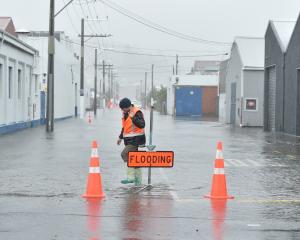Thousands of New Zealand women took up the call to work during World War 2 to fill the gaps left by their men and help support the war effort.
In 1930 the country's female workforce was estimated at 180,000, but by the end of 1942 there were about 228,000 in civilian employment - 75,000 in essential services and 153,000 in other employment.
It meant more women working in areas where they usually worked - offices, clothing factories and woollen mills - and more women in areas where they had rarely worked - public service, railways, trams, engineers, farms and driving.
Abbie Kirkwood, of Portobello, says those who worked in the factories at home during the war provided essential services, whatever it was they did, and it is important their contribution be recognised.
"Without us, what would have happened? Looking back now, we took an awful lot in our stride,'' the 85-year-old says.
She was just 16 when she was given two options - working in a clothing factory or a match factory.
She chose the clothing factory, Ross and Glendining, in Stafford St, even though she hated sewing. It was the eve of World War 2 and alongside churning out women's clothing they also had to make officers' uniforms.
"People could not believe it was happening: then one day naval personnel turned up and the two men in the territorials and reserves were taken away. Then it hit us.''
For the women who worked in the factory, days started at 8am and went to 8pm three nights a week, and they also worked on Saturdays. By the end of her five years she was paid "5 12s - piddling money'', she says.
"It was long hours, pretty tiring. If you went to the toilet and were there too long, the manageress would come out to see what you were doing.''
The building was grey and damp and the only windows she could remember were the ones facing the street.
"It wasn't a pretty place to work, but we were better off than a lot.''
They often had their breaks at their machines and the long relentless hours eventually played on their health, she says. Even if they got injured they had to go on.
"We ate lunch at our machines, eating the dust and fluff as well.''
Along with the daily grind was the ever-present worry about how their fathers, brothers, husbands and boyfriends were coping at war, which hung like a pall over the workroom, she says.
"There was hardly a person in that room not worrying about someone overseas in service.''
Then there was the added worry of the daily visit from the postmaster bringing bad news.
"We'd all dread it. The boss would come out and touch you on your shoulder and you'd know.''
For Mrs Kirkwood, it was her brother, the late John Wheeler, who was fighting overseas. In her case the postie came knocking at home with news of his injuries and she still remembers the look on her mother's face.
"He was badly knocked around. We didn't know where he was.''
Despite the tragedies that befell some families, all the girls were very patriotic, wanting to do their best for those fighting overseas, even though they never knew how the war was going, Mrs Kirkwood says.
"We were all involved in war work, raising funds and sending parcels.''
They raised an "enormous amount of money'' for the patriotism fund, so soldiers had something to come back to, she says.
"We did raffles, dances, you name it. The boys weren't coming back to the land of milk and honey.''
She can clearly remember trudging home in the dark during the blackout after a 12-hour shift hunched over her sewing machine.
"We were dead tired.''
At the end of the day, she caught a tram from the Exchange home to Northeast Valley and then climbed the hill to home in the pitch darkness.
It was very scary, especially during a period when there was a man on the loose jumping out at unaccompanied females, she says.
When it happened to her she flung her ice-cream in the air and took off up the road screaming.
"It was horrible''.
The experience meant she lost all confidence in walking at night during the blackout.
It was not all bad times, she says. Those running the army barracks out at Forbury requested the company of the girls, offering to pick them up in an army lorry and take them out to the camp.
So Abbie went home to her mother and told her they had been asked out to "entertain the troops''.
"She wanted to know what that meant. I said, 'just dance with them'.''
She got permission and the girls had many a memorable night dancing with the troops with quite a few marriages eventuating out of those evenings, Mrs Kirkwood says.
"They really looked after us, and we had a nice supper.''
When the war ended, the girls were drafted into marching teams and given material in red, white and blue, from which to make skirts and tops.
"With my red hair, I felt like a toffee apple.''
An air force cadet showed them how to march and they took part in the victory celebrations, marching to the Octagon in the shape of a Union Jack.
"That's when we really all felt emotional.''
Not that it was all over entirely, Mrs Kirkwood says. Her brother came home with a damaged hand and experienced awful nightmares. Others left to take part in the occupation forces.
The camaraderie that developed during the war years was quite wonderful "even to this day, while there are only the odd few of us still around'', she says.












